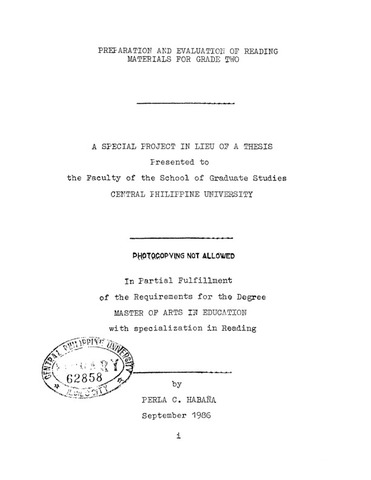Preparation and evaluation of reading materials for grade two

Page views
477Date
1986Author
Thesis Adviser
Defense Panel Chair
Defense Panel Member
Share
Metadata
Show full item record
Abstract
Reading ability is essential to success in all school work and in life outside of the school. A MECS publication states: "Reading abilities and habits have social significance as well as individual value. If a child fails in learning to read, he loses the self-esteem he needs for his own comfort and progress."
Thus, it is imperative for a student to be a good reader in order to attain success in his studies.
A person's reading ability, however, is not developed overnight. It is acquired through years of patient practice beginning with the early years of childhood. The reading habits developed during childhood determine, to a great degree, the adult reading patterns of the future.
Because of all that has been said, the development of the child's reading ability is one of the major responsibilities of the school; educators and curriculum planners consider it a vital part of the school program.
The reading program of the school curriculum has the pupil as the central figure and the teacher as the single most important factor in the development of reading skills. The great responsibility of teaching children develop reading ability lies in the hands of the teacher. Developing a wholesome attitude and interest in reading is an important objective and has a tremendous long-term significance. Juanino stressed that "teachers and parents must help create in children the desire to read for recreation and personal development, to learn more about the world, and to increase their understanding of people and society."
It is sad to note, however, that many of the grade six pupils from the public elementary schools in the Philippines today can neither read, write, nor compute. Because of this finding, the cry of the 1980's is "back to the basics." It has become the guidepost of the
New Elementary School Curriculum (NESC), in which, in the first three grades, the pupils' studies revolve only around the three R's and the new subject “Sibika at Kultura." It is hoped that, with this program, pupils would read with understanding, write legibly and correctly, and be able to add, subtract, and divide accurately. It is also hoped that a pupil who leaves school at any grade will be equipped with enough knowledge, skills, and attitudes to make him a productive member of society. The teacher has a very important role to play in the accomplishment of this program.
In order to carry out the important role of the teacher and to help provide the school with the needed materials for the new reading program, the researcher, together with the other MECS RO VI Reading Grantees of 1984-85, undertook the preparation of reading materials from pre-primer level up to grade two.
Statement of the Problem
This project is an attempt to prepare and evaluate reading materials for grade two. It, specifically, will seek to determine the answer to the following questions:
1. What type of stories appeal to grade two pupils?
2. How valid and usable are the reading selections prepared by the researcher?
3. How valid and reliable are the test exercises on each reading selection?
Description
Introduction and statement of the problem
Suggested Citation
Habaña, P. C. (1986). Preparation and evaluation of reading materials for grade two (Unpublished Master’s special paper). Central Philippine University, Jaro, Iloilo City.
Type
Special paperSubject(s)
Department
School of Graduate StudiesDegree
Master of Arts in Education with specialization in Reading (English)Shelf Location
GSL Theses 378.242 H113
Physical Description
158 leaves

